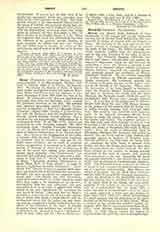

Becan (VERBRECK, VAN DER BRECK), MARTIN, controversialist, b. at Hilvarenbeek, Brabant, Holland, January 6, 1563; d. at Vienna, January 24, 1624. He entered the Society of Jesus, March 22, 1583, taught theology for twenty-two years at Wurzburg, Mainz, and Vienna, and was confessor to Emperor Ferdinand II from 1620 until the time of his death. He possessed a style clear and dignified, and noticeably free from the bitterness which marked the polemical literature of the day. His writings were directed principally against Calvin, Luther, and the Anabaptists; of these his “Manuale Controversiarum”, Mainz, 1623, treating of predestination, free will, the Eucharist, and the infallibility of the Church, passed through several editions. For a complete list see Sommervogel, “Bibliotheque de la compagnie de Jesus” (I, col. 1091-1111), wherein are mentioned by title forty-six volumes. His chief theological work, “Summa Theologi Scholasticae (4 vols. 4to, Mainz, 1612) is in great part a compendium of Suarez’s Commentary on St. Thomas Aquinas. By a decree of the Congregation of the Index, January 3, 1613, his book “Controversia Anglicana de potestate regis et pontificis” was put on the Index donec corrigatur, not so much to condemn certain exaggerations it contained as to prevent the faculty of theology of Paris from condemning it and at the same time adding some declarations against papal authority. The “Controversia” was corrected and published somewhat later with a dedication to Pope Paul V. Becan, in 1608, published at Mainz, “Aphorismi doctrinin Calvinistarum ex eorum libris, dictis et factis collecti”, in reply to Calvin’s “Aphorismi doctrine Jesuitarum”. Aphorismus XV, “Jesuitic vero qui se maxime nobis opponunt, aut necandi aut si id commode fieri non potest, ejiciendi, aut certe mendaciis ac calumniis opprimendi sunt” (The Jesuits, our chief adversaries, ought to be put to death, or, if that cannot be easily done, they ought to be banished, or, at any rate, overwhelmed with lies and calumnies), has been misconstrued so as to make it appear that Becan wished to say that Aphorismus XV contained the very words of Calvin. That such was not Becan’s intention is clear from the title of the book “Aphorismi ex eorum libris dictis et factis collecti” and the development shows that the author was only drawing what he considered a logical conclusion from the action of the Calvinists of the time. A lengthy discussion about this aphorism was carried on by A. Sabatier in the “Journal de Geneve” (January 26, 1896; May 10, 1896) and the “Revue Chretienne” (March 1, 1896; June 1, 1896), and by J. Brucker in the “Etudes” (April 15, and July 15, 1896).
FRANCIS D. O’LAUGHLIN.

